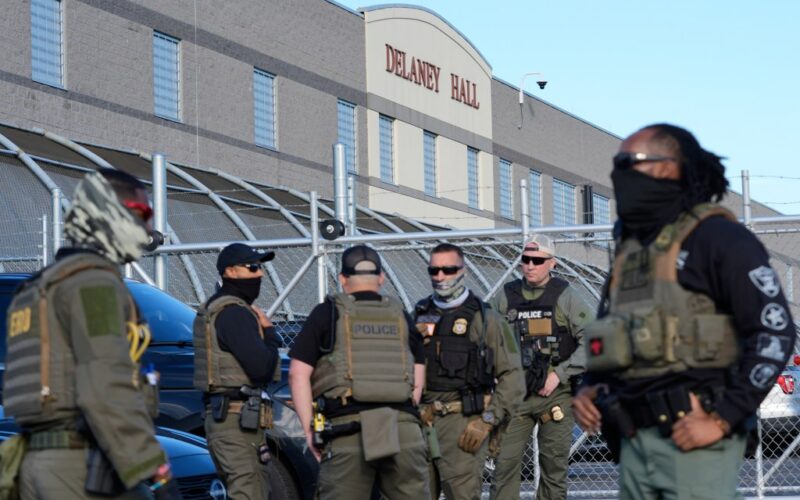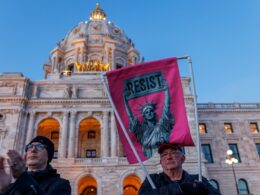When federal officials denied an auxiliary Roman Catholic bishop of Chicago the right to administer the sacraments inside Broadview Detention Facility earlier this month, Chicago-born Pope Leo XIV told reporters that he “would certainly invite the authorities to allow pastoral workers to attend to the needs of detained migrants.” The U.S. Conference of Bishops concurred with a statement expressing deep concern about “the conditions in detention centers and the lack of access to pastoral care.”
The current threat to religious freedom rights of detainees in immigration facilities is not exclusively a Roman Catholic concern nor is it only a local problem contained to ICE facilities in Chicago.
Recently, I participated in an interfaith delegation to Delaney Hall Detention Center in N.J. Along with the Rt. Rev. Matt Heyd, Episcopal bishop of New York and Imam Saffet Catovic Catovic, Muslim chaplain of Drew University, we witnessed a stunning lack of respect for the religious freedoms and basic rights of detainees at this Geo Group-run ICE facility.
We were there for a Bard College student whose family had fled the Taliban in 2021 and who had been welcomed by an Episcopal Church; two African Muslim street vendors picked up from Canal St. and an assistant imam for two mosques in the Bronx that the Interfaith Center of New York had worked with since 2022.
When we arrived at 451 Doremus Ave. — in the heart of “chemical ally” Newark — it was getting dark, the temperature had dropped and there was already a crowd of people — friends and family members of detainees — gathered in the driveway for the short weekly visitation. Pax Christi, NJ and the network of volunteers meeting direct needs outside Delaney Hall were distributing hand warmers, hot drinks, and clothing in case visitors inadvertently violated the strict visitation dress code.
Together, we approached the large guard wearing a black mask at the gate and asked about making a clergy visit. “Stand over there with everyone else,” he gestured in the direction of the gathered crowd. While this instruction might pass muster in New Jersey — states have different interpretations of the Religious Freedom Restoration Act (1993) — still, lumping clergy together with family members in one very limited visitation window puts detainees in the untenable position of having to choose between seeking family and pastoral care providers.
This policy is not consistent with New York State Corrections law allowing clergy of any faith tradition along with elected officials and judges a special right to show up unannounced at prison facilities.
Armed with names, A-numbers and corresponding unit number, we were finally allowed through the gate and after another outdoor security line to the sound of toddlers wailing in the cold, we got through security and entered a large recreational room with guards posted around the perimeter.
I recognized Ahmed by the prayer beads he was holding. An old man with white hair and beard, Ahmed had been in the country since 1986. He had driven an Uber, assisted with two mosques, and had spent $50,000 on a fraudulent immigration attorney who went to jail.
Ahmed said he was being fed and had access to a Qur’an. The issue was that he could not read it since when ICE had picked him up from his apartment, they had not let him take his glasses. No others had been provided for him.
Shortly after he was detained in the Bronx, ICE officers offered him the choice between spending an indefinite amount of time in detention in Texas or getting his affairs together for 30 days and then self-deporting. Thinking that “getting his affairs in order” would mean release, Ahmed chose the latter. He signed the document, but they never let him out of detention.
The Religious Freedom Restoration Act “Prohibits any agency, department, or official of the United States . . . from substantially burdening a person’s exercise of religion . . . except if it (1) furthers a compelling governmental interest; and (2) is the least restrictive means of furthering that compelling governmental interest.”
Where is the government’s interest in denying access to spiritual care to people who have lived for decades in the United States, who supported U.S. interests overseas, or who had made sacrifices for the spiritual care of their own community members?
The vast majority of the approximately 60,000 people currently in ICE detention by DHS are not murderers or dangerous criminals. They are our neighbors and we owe them the right to practice their religious expression. This is what basic dignity requires.
Breyer, an Episcopal priest, is the executive director at the Interfaith Center of New York.








